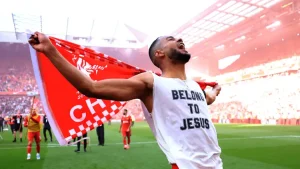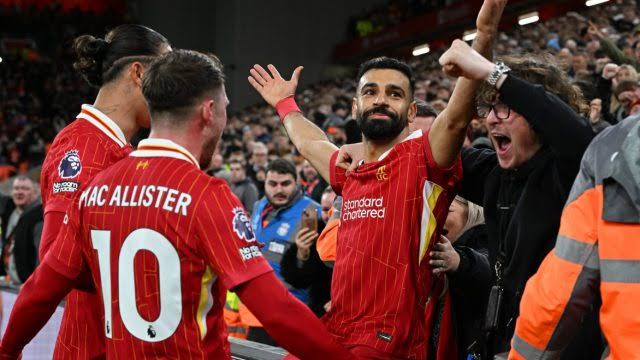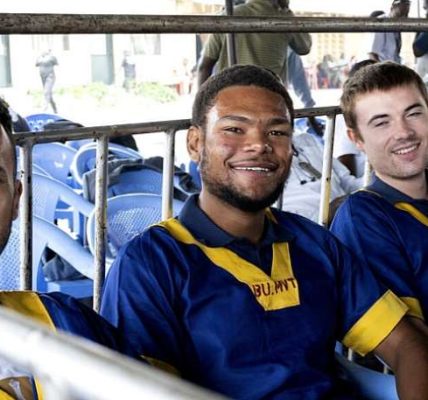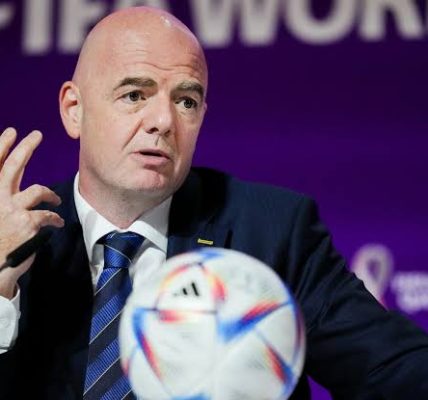Skip to content
Cody Gakpo, the Liverpool forward, has found himself in hot water with the FA after replicating a controversial celebration during his side’s title-clinching victory over Tottenham Hotspur.

Gakpo, who has enjoyed a bright start to his Liverpool career, marked his crucial role in the 3-1 win that secured the Premier League title with a celebratory gesture that has since sparked a backlash.
The Incident: A Touch of Iconic History
The moment occurred in the 80th minute of the game when Gakpo scored to put Liverpool 2-1 up, all but sealing their position as Premier League champions for the season.

In a move that left many fans and pundits talking, the Dutch international raised his arms and pointed skyward in a gesture reminiscent of the iconic ‘I belong to Jesus’ celebration famously popularized by Brazilian legend Kaka during his peak years, especially with AC Milan and the Brazilian national team.
For many, the gesture was seen as a tribute to faith, with Gakpo, a known Christian, embracing the kind of spiritual symbolism that Kaka made synonymous with his own career.
However, for others, particularly members of the footballing community in the UK, the act raised uncomfortable questions about the boundary between personal faith and public displays in a highly visible environment like a football pitch.

The FA’s Intervention
The celebration did not go unnoticed by the FA, who are reportedly set to reprimand Gakpo for the gesture.
Although players are free to express their religious beliefs, the FA maintains a strict policy on political, religious, or personal messages being conveyed during matches.
The regulations are intended to ensure that the pitch remains a neutral space, free from divisive or controversial statements, and to avoid any undue influence on fans in attendance or those watching at home.
Gakpo’s ‘I belong to Jesus’ celebration, while not explicitly political, has stirred a debate on the appropriate limits of religious expression in football.
While Kaka’s similar celebrations throughout his career were often celebrated for their positive and humble nature, the context of Gakpo’s gesture — at such a high-profile moment — has brought it under the microscope.
The Debate: Faith vs. Freedom of Expression
The intervention from the FA has sparked a wider debate about the role of faith and religion in football. On one hand, many argue that players should be free to express their beliefs as they see fit.
Football has long been a platform for athletes to showcase aspects of their identity, whether it’s through personal slogans, political stances, or religious expressions.
Players like Kaka, Cristiano Ronaldo, and more recently, Mo Salah, have often used their platform to display their faith, be it through tattoos, gestures, or even the wearing of items such as crosses or Islamic prayer beads.
These gestures are often met with admiration and respect, with many arguing that they can promote positive messages and inspire fans around the world.
On the other hand, there is the question of whether certain displays can be seen as promoting specific ideologies or messages in a way that may alienate or upset certain sections of the fanbase.
Football, after all, is a global sport with a diverse audience, and some critics believe that celebrations like Gakpo’s could be seen as an attempt to assert a religious or ideological stance in an environment that is supposed to be inclusive and neutral.
Others worry about the impact such displays can have on younger fans or those who may be struggling with their own beliefs or identities.
Gakpo’s Response
So far, Gakpo has not made a public comment about the FA’s investigation, but insiders suggest that the player is aware of the controversy surrounding his gesture.
Given his known commitment to his faith, it’s possible that the celebration was a deeply personal act for the Dutchman, meant as a simple expression of gratitude rather than an attempt to stir up controversy.
It’s also worth noting that Gakpo has been a devout Christian for much of his life and has often spoken about how his faith shapes both his personal and professional life.
Whether or not Gakpo faces a formal reprimand from the FA remains to be seen, but his case will undoubtedly contribute to the ongoing discussion about the line between personal expression and the rules of the game.
The Wider Context: Religion in Football
The issue of religious expression in football is nothing new.
In fact, it has become an increasingly prominent topic in recent years.
Players like Salah and others have used their platform to embrace and celebrate their religious identities.
Mo Salah, for example, is widely recognized for his displays of Islamic faith, including prostration after goals, which many of his fans view as a beautiful and humble part of his personality.
Similarly, players such as Marcus Rashford have used their platform to speak on social issues and advocate for causes they believe in.
For many fans and players, football is more than just a game; it is a platform for wider cultural expression.
The question of whether this expression should be allowed to extend to religious or spiritual beliefs is one that continues to divide opinions across the footballing world.
In the case of Gakpo, the timing of his celebration — in a match that had such significant implications for Liverpool — has undoubtedly heightened the controversy.
But it also raises important questions about the evolving nature of football, where the personal beliefs of players are coming to the forefront of public attention in ways they have not done before.
Moving Forward: What Happens Next?
The FA’s reaction will likely set a precedent for future incidents.
If Gakpo is reprimanded for his celebration, it may send a signal that religious gestures are no longer welcome on English football pitches, a move that could be met with resistance from both players and fans.
On the other hand, if the FA takes a lenient approach, it could open the door for greater religious expression in the future.
Either way, this episode serves as a reminder of the delicate balance between personal freedom and the regulations governing professional football.
For now, fans will be watching closely as the debate continues, with many hoping that the focus can remain on the game itself and the joyous achievement of Liverpool clinching the Premier League title.







